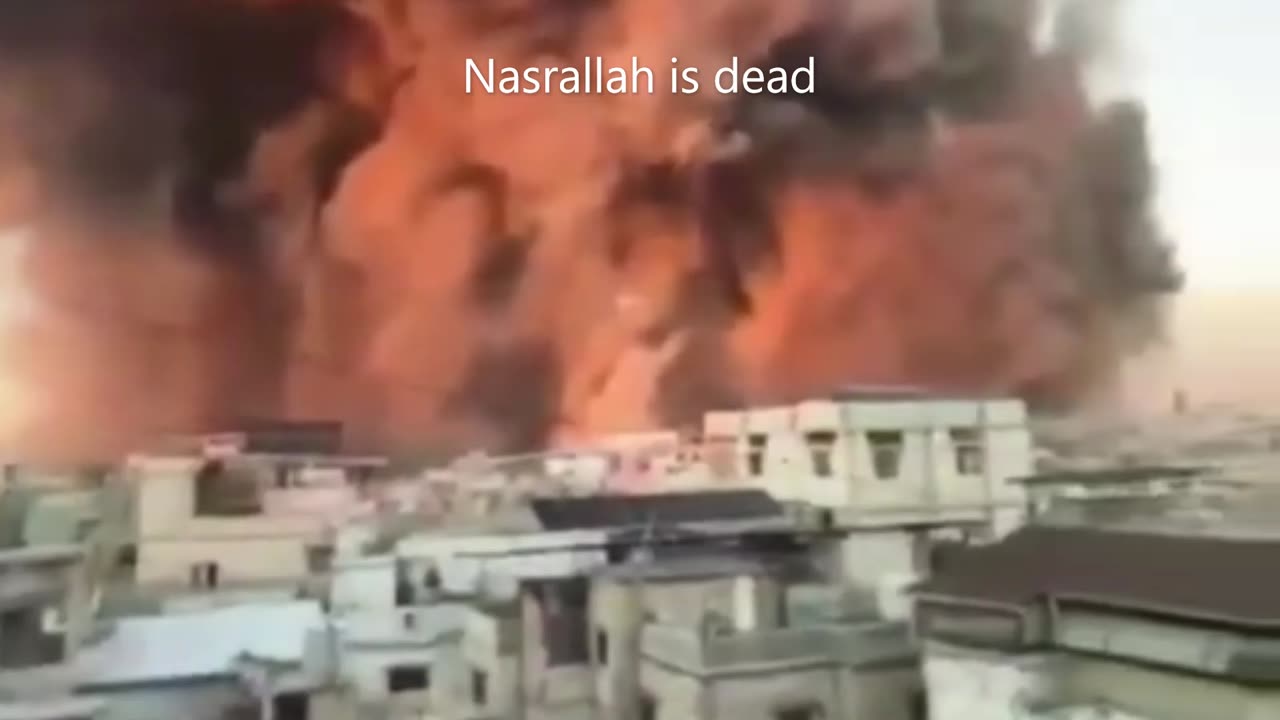Premium Only Content

Where Hezbollah leader Nasrallah was killed
On September 27, 2024, a significant shift occurred in the landscape of Middle Eastern politics with the assassination of Hassan Nasrallah, the leader of Hezbollah. This event took place during an Israeli airstrike in the Dahieh district of Beirut, Lebanon, targeting what was described by the Israel Defense Forces (IDF) as Hezbollah's "central headquarters." The airstrike not only resulted in Nasrallah's death but also claimed the lives of other senior Hezbollah officials, marking a critical juncture in the ongoing conflict between Israel and Hezbollah.
Hezbollah, founded in the early 1980s during the Lebanese Civil War, emerged as a militant group with strong ideological ties to Iran and a commitment to resisting Israeli influence in Lebanon. Under Nasrallah's leadership since 1992, Hezbollah transformed from a guerrilla organization into a formidable political and military force. Nasrallah became known for his charismatic speeches and strategic acumen, positioning Hezbollah as a key player in regional politics. His ability to galvanize support among Lebanese Shiites and project power against Israel contributed to his status as a significant figure in the Arab world.
In the months leading up to Nasrallah's assassination, tensions between Israel and Hezbollah had escalated dramatically. Rocket fire from Lebanon into northern Israel prompted retaliatory strikes by Israeli forces, leading to fears of a broader conflict. The situation was exacerbated by regional dynamics, including Iran's influence over Hezbollah and its ongoing support for militant groups in the region. As hostilities intensified, both sides prepared for potential escalation, setting the stage for a high-stakes confrontation.
The airstrike that killed Nasrallah was characterized by its precision and timing. Targeting a residential building that housed key Hezbollah leaders, it represented Israel's determination to weaken Hezbollah's command structure. The IDF justified the attack by asserting that it was necessary to protect Israeli citizens from ongoing threats posed by Hezbollah. However, this operation also raised concerns about civilian casualties and the implications of targeting high-profile leaders in urban environments.
The assassination of Hassan Nasrallah has far-reaching implications for Lebanon and the broader Middle East. Firstly, it creates a power vacuum within Hezbollah that could lead to internal strife or shifts in leadership dynamics. While Nasrallah had been a unifying figure for the group, his absence may embolden rival factions or lead to more radical elements gaining influence.
Secondly, this event could escalate tensions between Israel and Hezbollah further. In response to Nasrallah's killing, Hezbollah may retaliate with increased military actions against Israel or seek to rally support among its base by portraying itself as a victim of Israeli aggression. This cycle of violence could destabilize Lebanon and potentially draw in other regional actors.
The assassination of Hassan Nasrallah marks a significant turning point in Middle Eastern politics. As one of the most influential leaders in the region, his death not only impacts Hezbollah but also alters the strategic calculations of various state and non-state actors involved in the ongoing conflict. The repercussions will likely be felt for years to come as Lebanon grapples with its internal dynamics while navigating an increasingly volatile regional landscape. The future remains uncertain, but one thing is clear: the assassination has opened a new chapter in an already complex narrative of power, resistance, and conflict in the Middle East.
-
 LIVE
LIVE
Bare Knuckle Fighting Championship
1 day agoThe Bare Knuckle Show with Brian Soscia
127 watching -
 1:29:31
1:29:31
Russell Brand
3 hours agoBREAK BREAD EP. 9 - BRANDON LAKE
111K7 -
 3:12:17
3:12:17
Matt Kohrs
13 hours agoLive Trading $1M, The Bitcoin Pump & New Squeeze Alert || The MK Show
37.1K2 -
 LIVE
LIVE
LFA TV
15 hours agoBAN TRANS! | LIVE FROM AMERICA 12.17.24 11am EST
5,434 watching -
 5:46
5:46
China Uncensored
16 hours agoChina Just Lost a Quarter TRILLION Dollars
8.09K3 -
 23:26
23:26
Dave Portnoy
3 hours agoDavey Day Trader Presented by Kraken - December 17, 2024
66.5K8 -
 13:35
13:35
Neil McCoy-Ward
3 hours agoThis Is The CRAZIEST Situation I've Researched All Year...
24.1K8 -
 1:35:59
1:35:59
Dad Dojo Podcast
3 hours ago $2.73 earnedEP13: Youth Sports: Specialization vs Versatility
32.9K -
 1:06:44
1:06:44
2 MIKES LIVE
3 hours agoTHE MIKE SCHWARTZ SHOW with DR. MICHAEL J SCHWARTZ 12-17-2024
43.9K1 -
 36:14
36:14
BonginoReport
4 hours agoAfter Weeks of Cheering on Gun Violence, Left Calls for Gun Control (Ep.106) - 12/17/2024
86.2K119